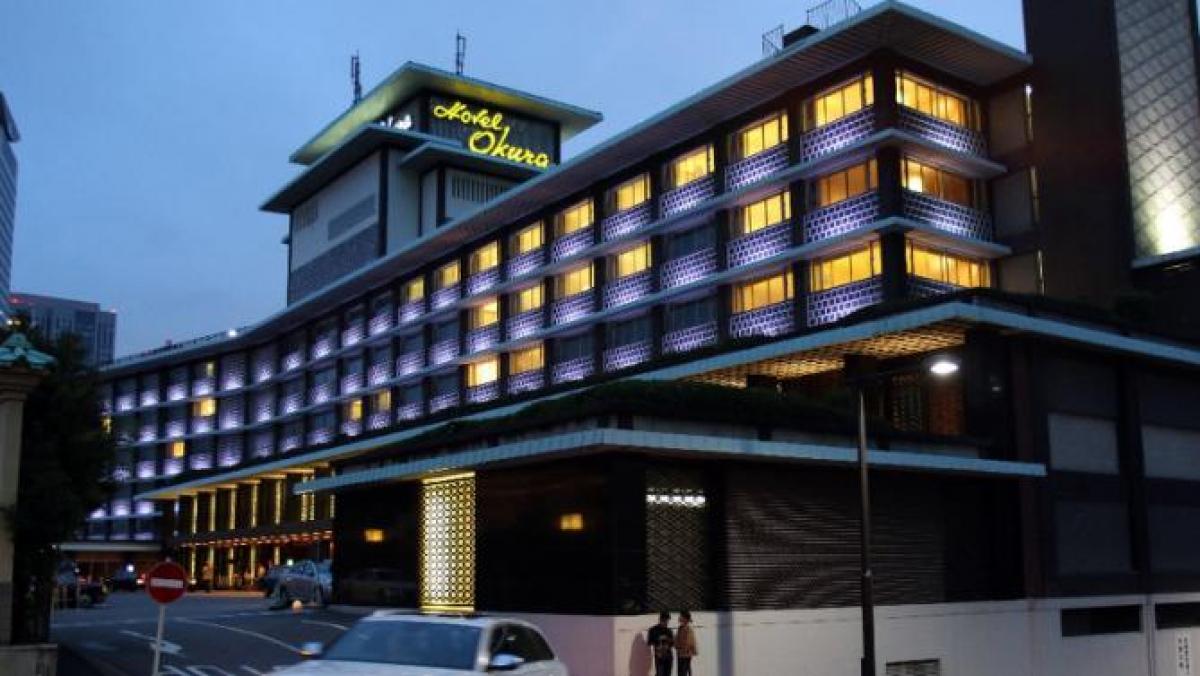Live
- AI can boost early diagnosis of liver disease: Study
- Varun's appointment as AHUDA chief infused new vigour in JSP cadres
- Lokayukta, HRC will remain in Kurnool: Minister Bharath
- S Korea, US, Japan unveil secretariat establishment, slam N Korea-Russia on Ukraine war expansion
- Light to Moderate Rains Expected in Telangana and Andhra Pradesh
- Pilgrims throng Sabarimala temple on opening day of long festive season
- Jwala Thoranam held at Srisailam temple
- Birsa Munda Jayanti celebrated
- Another tigress released in soft enclosure in Similipal
- Coastal defence exercise on Nov 20-21
Just In

x
Highlights
Tokyo\'s sixties-era modernist masterpiece Hotel Okura, which hosted foreign leaders, royalty, celebrities and even James Bond, turns off the lights Monday, more than a half century after it heralded Japan\'s post-war coming out party.
Tokyo's sixties-era modernist masterpiece Hotel Okura, which hosted foreign leaders, royalty, celebrities and even James Bond, turns off the lights Monday, more than a half century after it heralded Japan's post-war coming out party.
.jpg)
Despite an outcry from preservationists, the prestigious 53-year-old property shuts its doors for a four-year makeover that will give way to a gleaming highrise hotel -- the latest heritage building to undergo a facelift in the ultra-modern Japanese megalopolis.
The Okura's kimono-clad female staff and dated appearance -- highlighted by the smoky Mad Men-style Orchid bar and worn mustard-yellow carpets -- harks back to a different time. Others will remember the "Okura lanterns" lighting up a main lobby outfitted with modernist chairs or the big black buttons on its weathered world time zone map. James Bond was spotted at the Okura in Ian Fleming's novel "You Only Live Twice" and the hotel -- just across from the US embassy -- has put up a string of foreign leaders and US presidents, from Richard Nixon to Barack Obama.
It is also popular with Japan's political and cultural elite who were drawn to the Okura's restaurants and bars, traditional tea ceremonies and tense competitions of the chess-like game "Go".But with its outdated trappings and ancient infrastructure, the owners say they need to update the property to keep with its five-star reputation -- and prices.
A closing ceremony is to be held later Monday. The Okura's main building will be torn down next month, although an annex building next door it to remain open."It is a destruction of culture -- this building is a one and only, which truly integrates Japanese aesthetics with a Western-style hotel," said Tadashi Yamane, professor of urban design at Tokyo City University.
- 'Heartbreaking loss' -
The Okura, which was considered an architectural jewel in post-war Japan, opened in 1962, just two years before the Tokyo Olympics. "I see the tenacity of the Japanese people more than 50 years ago, who were determined to create a hotel that would prove Japan was once again a good member of the world," Yamane said. The 510-room new hotel will be set in twin towers -- the highest a 41 story glass building -- to open in spring 2019, ahead of Tokyo's Olympic Games the following year.
Commercial tenants will occupy the upper floors of the property whose lead architect Yoshio Taniguchi is the son of the original hotel's designer. "It is difficult for us now to provide a top Japanese hotel due to the building's age," an Okura spokeswoman told AFP.
"We will conserve traditional Japanese aesthetics but give clients the highest quality rooms and facilities," she added. Petitions to stop the demolition were launched inside and outside Japan, including one by Tomas Maier, creative director of Italian luxury goods firm Bottega Veneta.
London-based lifestyle magazine Monocle launched a "Save the Okura hotel" campaign soon after the reconstruction plan was announced last year. "It will be a heartbreaking and irreparable loss," Monocle said of the closure.
"Of course, redeveloping the Okura makes sense in purely economic terms... And here's the problem: the vested interests of construction and property are too powerful to resist."Tokyo City University's Yamane said that mindset highlights a broader issue with destroying heritage buildings in a city of around 30 million people.Other properties including the Palace Hotel and upscale Grand Prince Hotel Akasaka have undergone transformations in recent years, partly due to the need to install updated earthquake technology in the seismically active country.
But critics say the frantic pace of development -- most buildings are now designed to last just a few decades -- is driven by a "scrap and build" mentality."But people are not necessarily paying money only for something new and stylish," Yamane said."They are also paying for an experience that they cannot get anywhere else."

Next Story
More Stories
ADVERTISEMENT
© 2024 Hyderabad Media House Limited/The Hans India. All rights reserved. Powered by hocalwire.com







